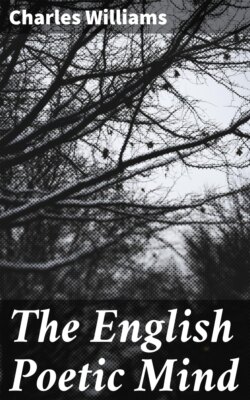Читать книгу The English Poetic Mind - Charles Williams - Страница 5
На сайте Литреса книга снята с продажи.
II
‘THE GROWTH OF A POET’S MIND’
ОглавлениеTable of Contents
There is in English poetry only one long study of the poetic mind. That study is the Prelude or the Growth of a Poet’s Mind. ‘A Poet’ to most readers means Wordsworth; to Wordsworth himself it would certainly have meant Wordsworth. But in the course of that account he describes at least one crisis which has been treated, in a very different way, both by Shakespeare and Milton, which has been approached by other poets and avoided by yet others. It seems worth while, therefore, to note once more, very briefly, the chief points in that growth and development, in order that its most important moment may be kept clearly in mind. Most of the books upon the Prelude consider it in relation to Wordsworth, and Wordsworth too often in relation to Nature, the sensationalist philosophy, Godwinism, and mysticism. He is comparatively rarely considered as a poet whose value lies in, and only in, the poems he writes—not in what he means by them. The Prelude has yet to be fully considered in relation to general poetry, and that would probably best be done by an edition of the poem annotated for that purpose with parallel passages from other poets. The present quotations are rather reminders of themselves than evidence of any theory. Wordsworth wrote the Prelude as a prelude, an account of his own preparation for what he was about to do; it was to invigorate him, to ‘fix the wavering balance’ of his mind, to ‘spur’ him on. It is therefore largely 10 an account of his own experiences, and those experiences were for him ‘Nature’ and Man. He was inclined to stress the necessity of ‘Nature’ for poets; he sympathizes with Coleridge for not having had his own advantages, for being ‘debarred from Nature’s living images’, and regrets that his influence had not soothed Coleridge’s youthful unhappiness. But the times at which Wordsworth’s own personal opinions enter into the Prelude are fairly clear, and we need not take those periods too seriously. The authority of poetry is only present when great poetry is present; poetry in the Prelude is never far away, but it is not always active.
It is Wordsworth’s personal opinion—he offers it as his ‘best conjecture’—that the poetic spirit is natural to every man. The passage in the 1805-6 version is more metaphysical than in the 1850. There it is explained that the Babe, gathering ‘passion from his Mother’s eye’, is eager to combine ‘in one appearance’ all the apparently detached elements and parts of ‘the same object’. The baby, one gathers, having vaguely realized that his mother is unity, is anxious to recognize unity in every object. This ‘conjecture’ Wordsworth afterwards removed, but it remains of interest for it suggests how the sensational apprehension of completeness in one being excites the poetic mind to see such a completeness in other separate objects. Each one is separate, yet each is complete, each is a whole. This is the first small result of that power which works afterwards to create in poetry ‘Composure and ennobling Harmony’.
Secondly, from its sense of its mother, from its 11 ‘most apprehensive habitude’, and from the ‘sensations which have been derived’ from its knowledge of its mother—from all these the baby derives ‘a virtue which irradiates and exalts’ all other objects. Its mind already works ‘in alliance’ with the works which it beholds; it is at once creator and receiver. It is these two characteristics which mark the small poet—(a) its passion for unifying (b) its powers and quickness to co-operate with ‘the active universe’. But this ‘first poetic spirit’ is, in most, afterwards ‘abated or suppressed’; in some it is ‘pre-eminent till death’. These last presumably are the poets—the poets and the poetry to whom Wordsworth so often applies the words ‘Powers’ and ‘Power’. For example: of books and their writers (v. 218),
